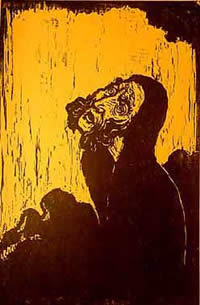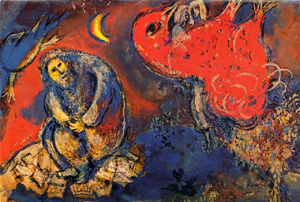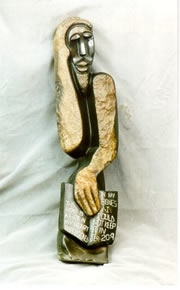The Call of Jeremiah:
Human Struggle with the Divine Summons
For Sunday January 28, 2007
Lectionary Readings (Revised Common Lectionary, Year C)
Jeremiah 1:4–10
Psalm 71:1–6
1 Corinthians 13:1–13
Luke 4:21–30
 |
Jeremiah, Woodcut by Jacob Steinhardt (1887-1968). |
Dwayne had ended two tenures of successful ministry under circumstances that might be charitably described as awkward. Once, he joked, he had been fired because he could not negotiate his institution's failures, and another time because the institution could not negotiate his failures. Both experiences, he wrly observed, proved the adage that individuals exist for institutions and not vice vera. When the passage of time provided him with some psychological space, a constellation of questions offered a rich fund for critical reflection. Perhaps he had a quirky personality? Maybe there was a bad fit between person and organization? How does one handle unexpected collisions between personal and institutional histories? And what about the residue of regret, discouragement, and feelings of powerlessness about the past? Most of all, Dwayne wondered how the call of God could be consonant with his many human foibles.
Thinking about Dwayne made me thankful for Jeremiah. The book of Jeremiah begins with a divine call, a call which was the beginning of not only forty years of faithful if reluctant service (627–587 BC), but also forty years of deeply personal struggle for the man the church has come to love as the "weeping prophet." And not only love. Anyone who has heeded the divine summons can identify with Jeremiah; his many troubles remind us that there is no call without conflict, and no summons without struggle. In the words of the young and earnest priest in George Bernanos's Diary of a Country Priest, "We pay a heavy, very heavy price for the super-human dignity of our calling. The ridiculous is always so near to the sublime. And the world, usually so indulgent to foibles, hates ours instinctively."
 |
Jeremiah fresco, Roman School, c 1120. |
Jeremiah responded to God's call with protests of his personal inadequacies. His sense of inadequacy did not derive from petty problems overcome by cheerful determination, from false modesty, nor was it a mere rhetorical device used by the writer. Across four decades of ministry Jeremiah struggled mightily with God's call on his life, with a sense of failure, with virulent opposition from detractors, and with deep discouragement. His protests recall Moses's litany of fears—lack of confidence, limited skill, insecurities about personal identity, and fear of rejection (Exodus 3-4), Isaiah's profound sense of personal sin (Isaiah 6), and Jesus's rejection by his hometown Nazareth (Luke 4:21–30).
The young priest in Bernanos's novel keeps a diary to unburden himself to God, to cultivate a sense of brutal honesty with himself, and to record "the simple trivial secrets of a very ordinary kind of life." He describes his rural parish as bored and boring, at times petty, and often indifferent. He loves his people deeply, prays for them, and visits every home at least once every three months. But like Jeremiah, Moses, and Isaiah, his candor and introspection lead to deep disillusionment. He knows that he is physically clumsy and socially awkward. He ponders the absurdity of prayer. He agonizes over his loneliness and sense of isolation. When he shares the gospel he sometimes feels like he is merely play-acting and parroting cliches. He likens his restlessness to "a hornet in a bottle." His subsistence diet and inadequate salary aggravate a chronic sickness that causes him to loathe his body. He admits that he himself is responsible for some of his bitter disappointments. Reflecting upon his "wretched weakness," he struggles with a deep sense of total failure, that "my best is nothing." From a merely human perspective the priest is not wrong to draw this conclusion. And so he frets about his call: "Am I where our Lord would have me? Twenty times a day I ask this question."
 |
Yvette Cauquil-Prince tapestry of Chagall's "Jeremiah". |
The priest's elders gave him wise advice about persevering amisdst questions about his call. "Keep saying your lessons. Go on with your work. Keep at the little daily things that need doing, til the rest comes. Concentrate. Think of a lad at his homework, trying so hard and his tongue sticking out. That's how our Lord would have us be when he gives us up to our own strength. Little things—they don't look like much, yet they bring peace. Like wild flowers which seem to have no scent, till you get a field full of 'em." Any and every call needs perseverance like this.
But God gave Jeremiah something far more precious than an exhortation to perseverance. He promised His divine presence. "Before I formed you in the womb I knew you, before you were born I set you apart; I appointed you a prophet to the nations. So do not be afraid, for I am with you" (Jeremiah 1:4–10). Believing this divine promise required the audacity and courage to believe that the Sender knew just who he was sending, that His message lives independent of the messenger, that His presence gave perspective to any problems, and that conflict was not inimical to His call. Like Moses and Isaiah, Jeremiah learned to acknowledge rather than to deny or even to overcome his many inadequacies.
 |
Jeremiah by Andrew Mabanji, Zimbabwe, stone sculpture. |
In the poignant novel Gilead, the narrator-pastor John Ames ponders a lifetime of listening for God's call. He reflects upon his accumulation of life experiences and how they have woven a rich tapestry whose beautiful texture could only result from many different strands—frailty and failure, memory and mystery, darkness and disappointment, regret and reconciliation, and, weaving it all together, sheer gratitude and joy at how remarkably beautiful the resulting garment of his life still is. Near the end of his life, he writes to his son: "I always imagine divine mercy giving us back to ourselves and letting us laugh at what we became, laugh at the preposterous disguises of crouch and squint and limp and lour we all do put on. I enjoy the hope that when we meet [in heaven] I will not be estranged from you by all the oddnesses life has carved into me."
For further reflection
* Contemplate Paul's own sense of inadequacies in 2 Corinthians 4:7–12.
* Imagine that the promises of God in Jeremiah 1:4–10 are spoken directly to you.
* What have been your own conflicts and struggles in God's call on your life?
* In what ways do you identify with Dwayne, Moses, Isaiah, Jeremiah, and even Jesus's rejection at Nazareth?
* For further reflections on vocation and calling, see Georges Bernanos, The Diary of a Country Priest; Parker Palmer, Let Your Life Speak; and Marilyn Robinson, Gilead.





